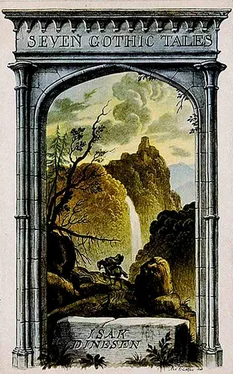Isak Dinesen - Seven Gothic Tales
Здесь есть возможность читать онлайн «Isak Dinesen - Seven Gothic Tales» — ознакомительный отрывок электронной книги совершенно бесплатно, а после прочтения отрывка купить полную версию. В некоторых случаях можно слушать аудио, скачать через торрент в формате fb2 и присутствует краткое содержание. Жанр: unrecognised, на английском языке. Описание произведения, (предисловие) а так же отзывы посетителей доступны на портале библиотеки ЛибКат.
- Название:Seven Gothic Tales
- Автор:
- Жанр:
- Год:неизвестен
- ISBN:нет данных
- Рейтинг книги:5 / 5. Голосов: 1
-
Избранное:Добавить в избранное
- Отзывы:
-
Ваша оценка:
- 100
- 1
- 2
- 3
- 4
- 5
Seven Gothic Tales: краткое содержание, описание и аннотация
Предлагаем к чтению аннотацию, описание, краткое содержание или предисловие (зависит от того, что написал сам автор книги «Seven Gothic Tales»). Если вы не нашли необходимую информацию о книге — напишите в комментариях, мы постараемся отыскать её.
The stories in this collection are:
Deluge at Norderney
The Old Chevalier
The Monkey
The Roads round Pisa
The Supper at Elsinore
The Dreamers
The Poet
Seven Gothic Tales — читать онлайн ознакомительный отрывок
Ниже представлен текст книги, разбитый по страницам. Система сохранения места последней прочитанной страницы, позволяет с удобством читать онлайн бесплатно книгу «Seven Gothic Tales», без необходимости каждый раз заново искать на чём Вы остановились. Поставьте закладку, и сможете в любой момент перейти на страницу, на которой закончили чтение.
Интервал:
Закладка:
“In the garden at Assens my mother and I lived in what I think is called an idyll. Our days were filled with nothing but innocence and pleasure.”
Miss Malin, who had been listening attentively, always keen for any kind of narrative, here interrupted the narrator, sighing a little. “Ah,” she said, “I know about idylls. Mais moi je n’aime pas les plaisirs innocents.”
“I had a friend in Assens, or so I thought,” Jonathan went on, “a clever boy by the name of Rasmus Petersen, a couple of years older than I, and taller by a head. He was to have been a parson, but he got into some trouble and never succeeded, but when he was a student in Copenhagen he was a tutor in many great houses. He always took a great interest in me, but though I admired him I never felt quite well in his company. He was very sharp, like a razor; you did not come away from him without having cut your fingers a little, although at the moment you might not feel it. When I was about sixteen he told my father that I ought to come with him to Copenhagen, to study under the learned people that he knew there, for he thought me a very brilliant boy.”
“And were you very brilliant?” asked Miss Malin with surprise.
“Alas, no, Madame,” said Jonathan.
“When I first came to Copenhagen,” Jonathan went on, “I was very lonely, because there was nothing for me to do. It seemed to me that there was nothing but people there. They did not care for me, either. When I had talked to them for a little they generally walked away. But after a while my interest was caught by the expansive hothouses and nurseries of the royal palaces and of the great noblemen. Amongst these the most renowned were those of Baron Joachim von Gersdorff, who was High Steward of Denmark, and himself a great botanist, who had traveled all over Europe, India, Africa, and America and collected rare plants everywhere.
“Have you heard of this man before, or do you know him? He came of a Russian family, and his wealth was such as is otherwise unknown in Denmark. He was a poet and musician, a diplomat, a seducer of women, even then, when he was an old man. Still, all this was not what caught your mind about the man. But it was this: that he was a man of fashion. Or you might say that fashion itself was only, in Copenhagen at least, the footman of Baron Gersdorff. Whatever he did at once became the thing for everybody to do. Oh, I do not want to describe the man. You will know, I think, what a man of fashion means. I have learned it. Such a man was he.
“I had not been to his hothouses, to which Rasmus obtained admission for me, more than a few times when I met Baron Gersdorff himself there one afternoon. Rasmus presented me to him, and he greeted me in a very friendly way, and offered to show me the whole place, which he did with much patience and benevolence. After that day I nearly always found him there. He took me on to write a catalogue for his cactus house. We spent many days together in that hot glasshouse. I liked him much, because he had seen so much of the world, and could tell me about the flowers and insects of it. At times I noticed that my presence moved him strangely. One afternoon, as I was reading to him a treatise upon the mouth of the tube of the Epiphyllum, I saw that he had shut his eyes. He took my hand and held it, and as I finished he looked up and said: ‘What am I to give you, Jonathan, as a finder’s fee?’ I laughed and answered that I did not think that I had found out anything exceptional yet. ‘Oh, God,’ he said, ‘a finder’s fee for the summer of 1814!’ Shortly after that day he began to talk to me of my voice. He told me that I had a remarkably sweet voice, and asked me to let him arrange for Monsieur Dupuy to give me singing lessons.”
“And did you have a lovely voice?” asked Miss Malin with some incredulity, for the voice of the narrator was low and hoarse.
“Yes, Madame,” he said, “at that time I had a very pretty voice. I had been taught to sing by my mother.”
“Ah,” said Miss Malin, “there is nothing in the world more lovely than a lovely boy’s voice. When I was in Rome there was a boy named Mario in the choir of the Jesu, who had a voice like an angel. The Pope himself told me to go and hear him, and I was well aware why, for he was hoping to convert me to Rome, and thought that this golden angel’s song might break down all my resistance. From my pew I saw the Pope himself burst into tears when, like a swan taking the wing, this Mario lifted up his voice in Carissimi’s immortal recitative: ‘Get thee behind me, Satan!’ Oh, that good Pius VIII. Two days later he was wickedly poisoned by three cantharide pills. I do not hold with popery, but I admit that he was a fine figure of a Pope, and died like a man. And so you had your lessons, and became a virtuoso, Monsieur Jonathan?”
“Yes, Madame,” said Jonathan with a smile, “my lessons I had. And as I was always very fond of music I worked hard and made good progress. At the beginning of the third winter the Baron, who by this time never seemed to like to part with me, took me around to the great houses of his friends and made me sing for them. When I had first come to Copenhagen I used to stand outside the great houses on winter evenings, to see the flowers and chandeliers in the halls, and the young women as they got out of their carriages. Now I went in everywhere myself, and the ladies, old and young, were as kind to me as if I had been their child or young brother. I sang at Court, before King Frederick and Queen Marie, and the Queen smiled very kindly at me. I was very happy. I thought: How foolish those people are who tell you that the great people of the towns love nothing but riches and worldly honors. All these ladies and great gentlemen love music as much as I do—yes, more—and forget everything else for it, and what a great thing is the love of the beautiful.”
“Did you fall in love?” Miss Malin asked.
“In a way I was in love with all of them,” said Jonathan. “They had tears in their eyes when I sang; they accompanied me on the harp, or joined me in duets; they took flowers from their hair and gave them to me. But perhaps I was in love with the Countess Atalanta Danneskjold, who was the youngest of the sisters Danneskjold, whom they called the nine swans of Samsø. Her mother made us pose together in a charade, as Orpheus and Euridice. All that winter was very much like a dream, for do you not sometimes dream that you can sing whatever note you like, and run up and down the whole scale, like the angels on Jacob’s ladder? I sometimes dream that even now.
“But toward spring there befell me what I took to be a great misfortune, not knowing then what misfortune means. I fell ill, and as I was getting well the court physician, who was attending me, told me that I had lost my voice and that I had no hope of getting it back. While I was still in bed I was much worried by this, not only by the loss of my voice itself, but by the thought of how I should now disappoint and lose my friends, and how sad my life would now become. I was even shedding tears about it when Rasmus Petersen came to see me. I opened my heart to him, to get his sympathy in my distress. He had to get up from his chair and pretend to look out of the window to hide his laughter. I thought it heartless of him, and did not say any more to him. ‘Why, Jonathan,’ he said, ‘I have reason to laugh, for I have won my bet. I held that you were indeed the simpleton you look, which nobody else would believe. They think that you are a shrewd boy. It will not make the slightest difference in the world to you that you have lost that voice of yours.’ I did not understand him. I think I grew pale, even though his words cheered me.
“ ‘Come,’ he said, ‘the Baron Gersdorff is your father. I guessed as much, before I ever brought you to his hothouses, from looking at a portrait of him as a child, in which he also has the head of an angel. When he knew it himself he was more pleased than I have ever seen him. He said: “I have never had a child in my life. It seems very curious to me that I should have got one. Still, I believe this boy to be indeed the son of my body, and I shall reward him for that. But should I find that my soul is going to live on, in him—as God liveth I will legitimatize him, and leave him all that I own. If it be not possible to have him made a Baron Gersdorff, I will at least have him a Knight of Malta under the name of De Résurrection.”
Читать дальшеИнтервал:
Закладка:
Похожие книги на «Seven Gothic Tales»
Представляем Вашему вниманию похожие книги на «Seven Gothic Tales» списком для выбора. Мы отобрали схожую по названию и смыслу литературу в надежде предоставить читателям больше вариантов отыскать новые, интересные, ещё непрочитанные произведения.
Обсуждение, отзывы о книге «Seven Gothic Tales» и просто собственные мнения читателей. Оставьте ваши комментарии, напишите, что Вы думаете о произведении, его смысле или главных героях. Укажите что конкретно понравилось, а что нет, и почему Вы так считаете.












